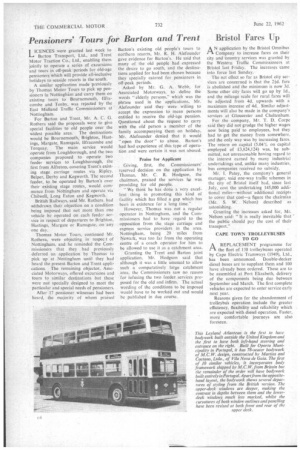Bristol Fares Up
Page 34

If you've noticed an error in this article please click here to report it so we can fix it.
A N application by the Bristol Omnibus
Company to increase fares on their city and country services was granted by the Western Traffic Commissioners at Bristol last Friday. The increases came into force last Sunday.
The net effect so far as Bristol city services are concerned is that the 2+d. fare is abolished and the minimum is now 3d. Some other city fares will go up by Id., and the mileage scale for rural fares will be adjusted from 4d. upwards with a maximum increase of 4d.. Similar adjustments will also be made in the company's services at Gloucester and Cheltenham.
For the company. Mr. T. D. Corpe said they did not grudge the higher wages now being paid to employees, but they had to get the money from somewhere, and the only way was by increasing fares. The return on capital (5.04% on capital employed of £3,824,124) was, he submitted, not unreasonable having regard to the interest earned by many industrial undertakings and, unlike many industries, bus companies received no subsidy.
Mr. I. Patey, the company's general manager, said one-way traffic schemes in the city of Bristol itself had, since last July. cost the undertaking 145,000 additional miles—without additional receipts to cover that cost—a figure the chairtrian (Mr. S. W. Nelson) described as astonishing.
Granting the increases asked for, Mr. Nelson said: "It is really inevitable that the public should pay the cost of their transport."
CAPE TOWN TROLLEYBUSES TO GO
AREPLACEMENT programme for the fleet of 138 trolleybuses operated by Cape Electric Tramways (1449), Ltd., has been announced. Double-decker diesel buses are to supplant them and 100 have already been ordered. These are to be assembled at Port Elizabeth, delivery of the components being due between September and March. The first complete vehicles are expected to enter service early next year.
Reasons given for the abandonment of trolleybus operation include the greater efficiency, flexibility and reliability which are expected with diesel operation. Faster, more comfortable journeys are also foreseen.












































































































